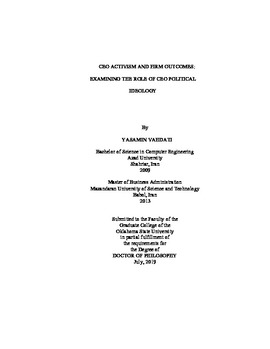| dc.contributor.advisor | Voss, Kevin E. | |
| dc.contributor.author | Vahdati, Yasamin | |
| dc.date.accessioned | 2020-01-31T16:11:49Z | |
| dc.date.available | 2020-01-31T16:11:49Z | |
| dc.date.issued | 2019-07 | |
| dc.identifier.uri | https://hdl.handle.net/11244/323451 | |
| dc.description.abstract | There is a growing interest in an emerging phenomenon, CEO activism, in which a firm's CEO communicates his or her stand on social-political issues. Researchers have examined the effect of CEO activism on public opinion, customers' attitudes, purchase decisions, and employee's relationship with external stakeholders. Scholars argue that CEO activism is distinct from nonmarket strategy components--Corporate Social Responsibility (CSR) and Corporate Political Activity (CPA). Prior research does not address how CEO activism is distinct from CSR and CPA and how they relate to each other. CPA involves the firm's activities, mainly lobbying and Political Action Committee (PAC) contributions, intended to shape governmental policy favorable to the firm. I draw on upper echelons theory as well as research on CPA and CSR to examine the effect of CEO activism, as measured by the number of non-business organizations with which the CEO is affiliated, on the firm's CSR (as rated by MSCI) and CPA (dollar amount spent on lobbying and PACs) as well as the downstream effect on the firm's sales growth. I theorize an interaction effect between CEO activism and CEO's political ideology, as measured by an index of CEO's political contributions ten years prior to their tenure (liberalism index), on the firm's CSR and CPA. Further, I predict a positive association between sales growth and both CSR and CPA. I use a lagged design with CSR and CPA measured two years after CEO's appointment and sales growth, three years after the CEOs start. My sample includes CEOs of S&P's 1500 companies who were appointed in the time window 2001 to 2011. Using 3-stage least square (3SLS) estimation method, I find that the interaction effect between CEO activism and CEO political ideology to be positively related to the firm's CPA spending with a stronger association between CEO activism and firm's CPA for liberal CEOs. Contrary to my hypotheses, I find a negative relationship between CPA and sales growth. The data does not substantiate the hypothesized interaction effect on CSR. However, I do find a positive relationship between CSR and sales growth. | |
| dc.format | application/pdf | |
| dc.language | en_US | |
| dc.rights | Copyright is held by the author who has granted the Oklahoma State University Library the non-exclusive right to share this material in its institutional repository. Contact Digital Library Services at lib-dls@okstate.edu or 405-744-9161 for the permission policy on the use, reproduction or distribution of this material. | |
| dc.title | CEO Activism and Firm Outcomes: Examining the Role of CEO Political Ideology | |
| dc.contributor.committeeMember | Arnold, Todd | |
| dc.contributor.committeeMember | Flaherty, Karen | |
| dc.contributor.committeeMember | Pappas, James | |
| osu.filename | Vahdati_okstate_0664D_16364.pdf | |
| osu.accesstype | Open Access | |
| dc.type.genre | Dissertation | |
| dc.type.material | Text | |
| dc.subject.keywords | ceo activism | |
| dc.subject.keywords | corporate political activity | |
| dc.subject.keywords | corporate social responsibility | |
| dc.subject.keywords | csr | |
| dc.subject.keywords | political ideology | |
| thesis.degree.discipline | Business Administration | |
| thesis.degree.grantor | Oklahoma State University | |
